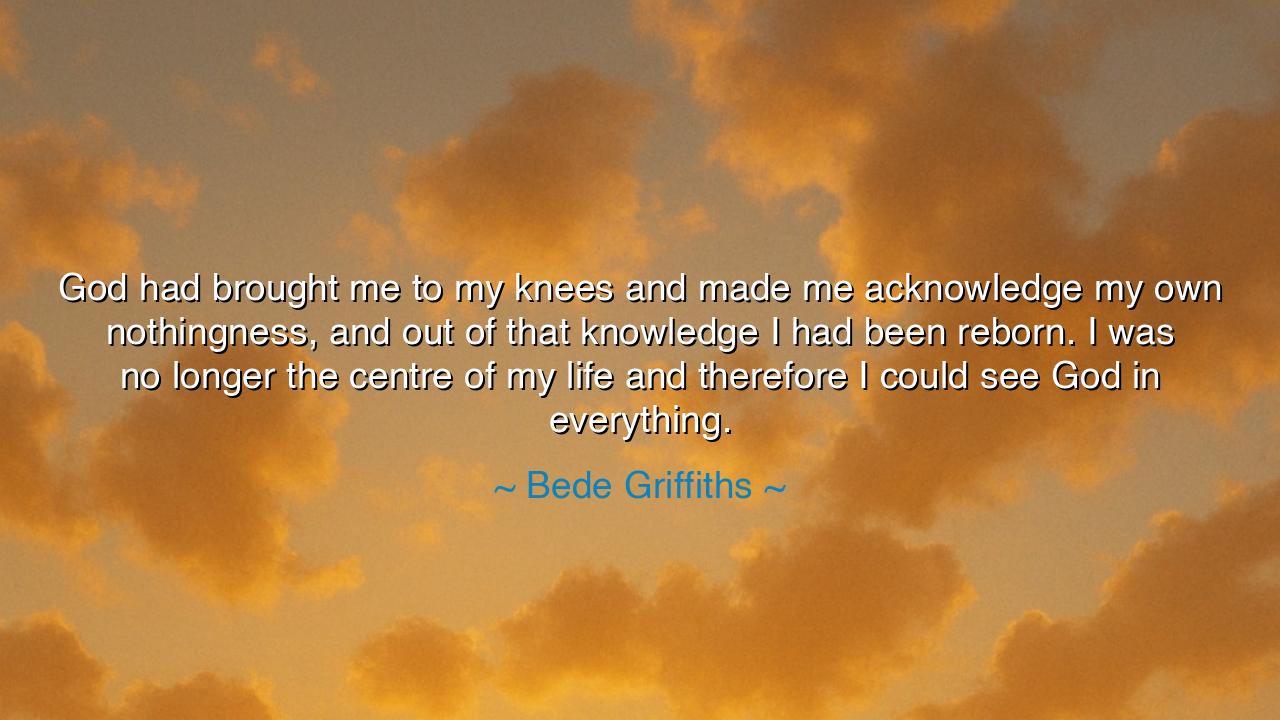
God had brought me to my knees and made me acknowledge my own
God had brought me to my knees and made me acknowledge my own nothingness, and out of that knowledge I had been reborn. I was no longer the centre of my life and therefore I could see God in everything.






Hear, O seekers of the eternal, the words of Bede Griffiths, a pilgrim of both East and West, who declared: “God had brought me to my knees and made me acknowledge my own nothingness, and out of that knowledge I had been reborn. I was no longer the centre of my life and therefore I could see God in everything.” This is no light reflection, but the cry of a soul that has passed through fire, broken pride, and emerged into radiant vision. It speaks of surrender, of humility, and of the rebirth that comes when man ceases to worship himself and learns instead to see divinity everywhere.
The origin of these words lies in Griffiths’s life as a Christian monk who crossed the boundaries of culture and religion. Born in England, raised in the tradition of Western thought, he later went to India, where he lived in an ashram, uniting Christian contemplation with Hindu wisdom. In his journey, he encountered both doubt and grace, and in the breaking of his self-centeredness, he discovered a truth shared by sages across time: that the path to God begins with the recognition of one’s nothingness before the Infinite.
Consider, O listener, the story of St. Augustine, who in his restless youth chased glory, pleasure, and pride. Only when life’s illusions collapsed did he fall to his knees, crying out, “Our hearts are restless until they rest in Thee, O Lord.” In that surrender, Augustine too was reborn. His greatness came not from exalting himself, but from emptying himself. The same truth Bede Griffiths proclaimed: that by stepping down from the throne of self, one makes room for God to reign.
Or look to the Buddha, who renounced his palace, his wealth, and his illusions of permanence. In his enlightenment beneath the Bodhi tree, he too acknowledged the nothingness of the self as an illusion, and from that recognition he was reborn into a vision of unity and compassion. Though different in path, the truth is the same: only when the ego dissolves can the soul see the divine woven into all things.
Thus, Griffiths’s words are not of despair but of liberation. To see our nothingness is not to despise our existence, but to recognize its true place. We are not the centre of the universe; we are not gods unto ourselves. When we cease to grasp at being everything, then we are free to be part of everything—to see God in the flower, the river, the stranger, the enemy, the friend. Humility becomes vision, and vision becomes love.
The lesson is plain: if you would see clearly, let go of pride. Do not cling to the illusion that your desires, your ambitions, your pain, or your triumphs make you the centre of existence. They are but passing waves upon the infinite ocean. To bow before God is to awaken to this vastness, to be reborn into wonder. Then, as Griffiths said, you will behold the divine everywhere—not only in temples, but in the sky, in the soil, in the faces of those around you.
Practical action lies before you. Each day, practice humility: begin not with your demands, but with gratitude. In prayer, in meditation, in silence, acknowledge your nothingness before the great mystery. When pride tempts you to place yourself above others, remember that all are children of the same source. When despair whispers that your life is meaningless, remember that meaning is not found in being the centre, but in belonging to the whole. In this way, surrender becomes strength, and humility becomes vision.
So let Griffiths’s teaching echo within your heart: only when brought to our knees do we learn to stand in truth. Only when we confess our nothingness do we awaken to the everything of God. And only when we cease to place ourselves at the centre do we find that the universe is filled with divine light, radiant in every living thing.






AAdministratorAdministrator
Welcome, honored guests. Please leave a comment, we will respond soon